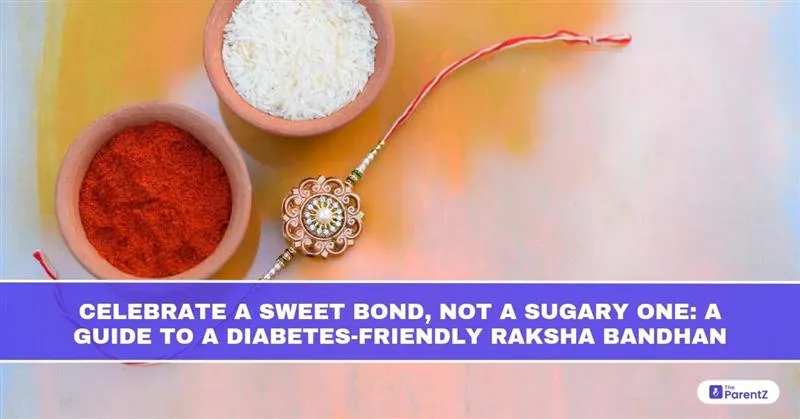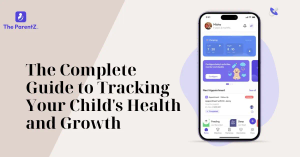“A thread tied with love is more powerful than any treat sweetened with sugar.”
Raksha Bandhan is a festival of affection, rituals, and lifelong promises. But for families of children with diabetes, especially Type 1 Diabetes, which often begins in childhood, the idea of a sweet celebration can quickly turn into a moment of caution, anxiety, and guilt.
Does that mean your child shouldn’t enjoy this festival fully?
Absolutely not.
Childhood diabetes may require boundaries, but it does not demand emotional restriction. The beauty of Raksha Bandhan lies not in the laddoo but in the laughter, shared moments, and the bond between siblings. This guide offers emotional support, medically accurate advice, and practical alternatives so every child can feel included, safe, and celebrated.
Understanding Childhood Diabetes: A Brief Overview
According to World Health Organization (WHO) estimates and NHS data, childhood Type 1 Diabetes is rising globally, including in India. It’s an autoimmune condition where the pancreas produces little to no insulin, requiring daily insulin therapy and blood sugar monitoring. Some children also live with Type 2 Diabetes, which is often associated with lifestyle and genetics.
Festivals like Raksha Bandhan pose challenges:
- Sudden surges in carbohydrate intake
- Irregular eating patterns
- Sugar-rich offerings from relatives and friends
- The emotional burden of being “left out”
But with mindful preparation and emotional framing, Raksha Bandhan can be a celebration of inclusion, not restriction.
Emotion Over Indulgence: Reshaping Celebration for Children
PubMed-published pediatric diabetes research emphasizes the psychological toll of constant food restrictions in diabetic children. Exclusion from festive treats can result in:
- Food insecurity mindset
- Low self-esteem
- Increased craving or binge-eating tendencies later in life
To avoid this, the key lies in replacing sugar with presence.
Try this instead:
- Create a “Raksha Memory Box” where each sibling writes or draws a memory instead of exchanging sweets.
- Make a new family ritual like dancing, painting, or storytelling that becomes a tradition more precious than sugar.
- Gift your sibling a personalized letter, handmade bookmark, or bracelet instead of mithai.
This helps rewire how children perceive joy: from consumption to connection.
Building a Safe Environment: Advice for Parents and Family
According to a 2022 study in the Journal of Pediatric Endocrinology and Metabolism, parental involvement and community awareness are the strongest predictors of well-managed childhood diabetes.
What parents and relatives can do:
- Inform before the festival: Let extended family and guests know in advance about the child’s dietary restrictions. Most people are happy to accommodate if they’re gently informed.
- Keep glycemic index in mind: Even fruits like mangoes and bananas can cause sugar spikes if portioned improperly. Use tools like the Glycemic Index chart (American Diabetes Association) to plan safe meal options throughout the day.
- Don’t skip meals to “make space” for treats: That backfires. Starvation before sweets increases blood sugar variability. Ensure balanced meals are maintained.
- Empower, don’t police: Allow the child to participate in food choices under your supervision. Help them say “no” with confidence rather than forcing restriction with fear.
- Monitor closely but lovingly: Use Continuous Glucose Monitoring (CGM) or finger prick tests before and after celebrations, but frame it as part of their superhero care, not a punishment.
Non-Sugary Alternatives to Ritual Offerings (Without Using Sweet Recipes)
The tradition of offering sweets during Rakhi can be deeply emotional. But “sweetness” isn’t about sugar, it’s about sentiment.
Here’s how you can uphold traditions without compromising safety:
Instead of traditional mithai:
- Offer a symbolic nut tray with almonds, walnuts, or roasted seeds. These have low glycemic impact and are nutrient-dense.
- Use a tiny portion of 90% dark chocolate (if tolerated) approved in moderation for some children with stable glucose control.
- Decorate the puja thali with colorful fruits like pomegranate pearls, kiwi slices, and berries visually festive, nutritionally rich.
- Replace sugar-based tikka with a turmeric-chandan (sandalwood) mix, which is traditionally cooling and anti-inflammatory.
Instead of gifting packaged sweets:
- Gifting a handmade Raksha Bandhan card, toy, book, or art supplies makes the moment memorable and non-food-centric.
- Encourage relatives to donate to a diabetes care fund in the child’s name, this teaches value-based gifting.
Mental Health Matters Too
Children with chronic conditions often carry emotional weight beyond their years. A 2021 NHS study found that 1 in 3 children with diabetes experience anxiety related to food and social participation.
What helps:
- Verbal reassurance: Remind them they are not different, only unique.
- Inclusive language: Avoid saying “You can’t have this.” Say “Let’s find a version that loves you back.”
- Involve siblings: Let the sibling tying the rakhi take part in meal prep, so the bond deepens through shared care.
Final Thought: The Real Sweetness Is in the Bond
A diagnosis should never define a celebration.
Childhood diabetes is not a limitation; it’s just a new lens to view joy through. Raksha Bandhan is an opportunity to teach children that love isn’t measured in sugar but in understanding, presence, and protection.
“May your Rakhi be tied with the thread of empathy, and may your thali shine with the colours of care.”
By nurturing our children emotionally and nutritionally, we raise a generation that understands how to love others and themselves mindfully.






Be the first one to comment on this story.